7 start with F start with F

eTextbooks are now available to purchase or rent through VitalSource.com! Please visit VitalSource for more information on pricing and availability.
Faces of Contemporary Russia is a one-semester textbook for high-intermediate to advanced level Russian students that aims to develop students' linguistic proficiency by examining significant personalities in current Russian culture. In addition to introductory and concluding chapters, the book features twelve individuals (one per chapter), drawing from a range of areas such as arts, sports, journalism, and business. While upper-level Russian textbooks tend to emphasize grammar and reading more traditional works of Russian literature, this book instead seeks to primarily engage students in learning about and discussing the breadth of contemporary Russian culture while weaving the study of grammar and vocabulary into those discussions. In addition to readings and in-class communicative activities, the book also features guided research assignments that encourage students to make use of the many personality interviews and YouTube clips available online.
For Instructors: Exam copies of the textbook are available free of charge to instructors and can be ordered on this page. To request a print sample, please use the "print" exam copy button. To request a digital sample, instructors should log onto VitalSource.com, select "Faculty Sampling" in the upper right-hand corner, and select the desired product.
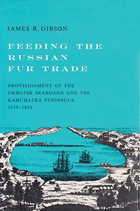
James R. Gibson offers a detailed study that is both an account of this chapter of Russian history and a full examination of the changing geography of the Okhotsk Seaboard and the Kamchatka Peninsula over the course of two centuries.
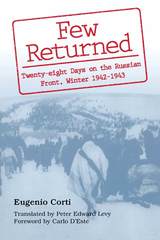
After World War II more than one hundred books appeared that dealt with the experience of the Italian army in Russia, and particularly the terrible winter retreat of 1942-1943. Few Returned (I piu' non ritornano) is the only one of these that is still regularly reissued in Italy.
Eugenio Corti, who was a twenty-one-year-old second lieutenant at the time, found himself, together with 30,000 Italians and a smaller contingent of Germans, encircled on the banks of the River Don by enemy forces who far outnumbered them. To break out of this encirclement, these men undertook a desperate march across the snow, with constant engagements and in temperatures ranging from -20 to -30 degrees Fahrenheit. Whereas supplies were air-dropped to the Germans, the predicament of the Italians was far more difficult: lacking gasoline, they were compelled to abandon their vehicles and to proceed without heavy arms, equipment, ammunition, or provisions. Even the wounded had to be abandoned, though it was well known that the soldiers of the Red Army"enraged by the brutality of the German invasion"killed all the enemy wounded who fell into their hands. After twenty-eight days of encirclement, only 4,000 of the 30,000 Italians made it out of the pocket.
Why is it that Corti's book, which was first published in 1947, continues after fifty years to be reprinted in Italy? Because, as Mario Apollonio of the University of Milan said, when the book first appeared: "It is a chronicle . . . but it is much more than that: behind the physical reality, there is the truth" about man at his most tragic hour. Apollonio adds: "The power of the writing immediately transforms the document into drama"; the result is a "novel-poem-drama-history." The philosopher Benedetto Croce found in Corti's book "the not infrequent gleam of human goodness and nobility." Few Returned is a classic of war literature that succeeds in bringing home the full hatefulness of war.
Eugenio Corti began writing his diary at a military hospital immediately after being repatriated from the Russian front. When in September 1943 Italy found itself cut in two by the Armistice, Corti, loyal to his officer's oath, joined up with what remained of the Italian army in the south and with those few troops participated in driving the Germans off Italian soil, fighting at the side of the British Eighth and the American Fifth Armies.
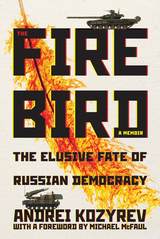
Andrei Kozyrev was foreign minister of Russia under President Boris Yeltsin from August 1991 to January 1996. During the August 1991 coup attempt against Mikhail Gorbachev, he was present when tanks moved in to seize the Russian White House, where Boris Yeltsin famously stood on a tank to address the crowd assembled. He then departed to Paris to muster international support and, if needed, to form a Russian government-in-exile. He participated in the negotiations at Brezhnev’s former hunting lodge in Belazheva, Belarus where the leaders of Russia, Ukraine, and Belarus agreed to secede from the Soviet Union and form a Commonwealth of Independent States. Kozyrev’s pro-Western orientation made him an increasingly unpopular figure in Russia as Russia’s spiraling economy and the emergence of ultra-wealthy oligarchs soured ordinary Russians on Western ideas of democracy and market capitalism.
The Firebird takes the reader into the corridors of power to provide a startling eyewitness account of the collapse of the Soviet Union, the struggle to create a democratic Russia in its place, and how the promise of a better future led to the tragic outcome that changed our world forever.
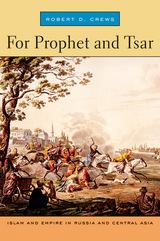
Russia occupies a unique position in the Muslim world. Unlike any other non-Islamic state, it has ruled Muslim populations for over five hundred years. Though Russia today is plagued by its unrelenting war in Chechnya, Russia’s approach toward Islam once yielded stability. In stark contrast to the popular “clash of civilizations” theory that sees Islam inevitably in conflict with the West, Robert D. Crews reveals the remarkable ways in which Russia constructed an empire with broad Muslim support.
In the eighteenth century, Catherine the Great inaugurated a policy of religious toleration that made Islam an essential pillar of Orthodox Russia. For ensuing generations, tsars and their police forces supported official Muslim authorities willing to submit to imperial directions in exchange for defense against brands of Islam they deemed heretical and destabilizing. As a result, Russian officials assumed the powerful but often awkward role of arbitrator in disputes between Muslims. And just as the state became a presence in the local mosque, Muslims became inextricably integrated into the empire and shaped tsarist will in Muslim communities stretching from the Volga River to Central Asia.
For Prophet and Tsar draws on police and court records, and Muslim petitions, denunciations, and clerical writings—not accessible prior to 1991—to unearth the fascinating relationship between an empire and its subjects. As America and Western Europe debate how best to secure the allegiances of their Muslim populations, Crews offers a unique and critical historical vantage point.

The end of communism marked the re-emergence of a huge rise in organised crime across Russia and Eastern Europe. High-profile efforts to combat it have met with little success.
Patricia Rawlinson argues that burgeoning crime rates result not only from the failures of communism but also from the problems of free market economies.
Drawing on interviews with members of the Russian criminal underworld, the business community, journalists and the militia, she argues that organised crime provides us with a barometer of economic well-being, not just for Russia but for any market economy.
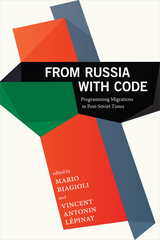
Contributors. Irina Antoschyuk, Mario Biagioli, Ksenia Ermoshina, Marina Fedorova, Andrey Indukaev, Alina Kontareva, Diana Kurkovsky, Vincent Lépinay, Alexandra Masalskaya, Daria Savchenko, Liubava Shatokhina, Alexandra Simonova, Ksenia Tatarchenko, Zinaida Vasilyeva, Dimitrii Zhikharevich
READERS
Browse our collection.
PUBLISHERS
See BiblioVault's publisher services.
STUDENT SERVICES
Files for college accessibility offices.
UChicago Accessibility Resources
home | accessibility | search | about | contact us
BiblioVault ® 2001 - 2024
The University of Chicago Press









